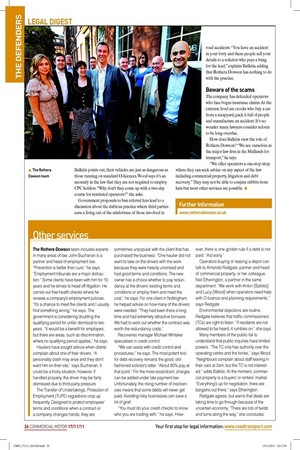The Rothera Dowson team includes experts in many areas of
Page 19

If you've noticed an error in this article please click here to report it so we can fix it.
law. John Buchanan is a partner and head of employment law. “Prevention is better than cure,” he says. “Employment tribunals are a major distraction.” Some clients have been with him for 10 years and he strives to head off litigation. He carries out free health checks where he reviews a company’s employment policies. “It’s a chance to meet the clients and I usually find something wrong,” he says. The government is considering doubling the qualifying period for unfair dismissal to two years. “It would be a benefit for employers, but there are areas, such as discrimination, where no qualifying period applies,” he says.
Hauliers have sought advice when clients complain about one of their drivers. “A personality clash may arise and they don’t want him on their site,” says Buchanan. It could be a tricky situation, however, if handled properly, the driver may be fairly dismissed due to third-party pressure.
The Transfer of Undertakings, Protection of Employment (TUPE) regulations crop up frequently. Designed to protect employees’ terms and conditions when a contract or a company changes hands, they are sometimes unpopular with the client that has purchased the business. “One haulier did not want to take on the drivers with the work because they were heavily unionised and had good terms and conditions. The new owner has a choice whether to pay redundancy at the drivers’ existing terms and conditions or employ them and meet the cost,” he says. For one client in Nottingham, he helped advise on how many of the drivers were needed. “They had been there a long time and had extremely attractive bonuses. We had to work out whether the contract was worth the redundancy costs.” Recoveries manager Michael Whitaker specialises in credit control.
“We can assist with credit control and procedures,” he says. The most potent tool for debt recovery remains the good, oldfashioned solicitor’s letter. “About 80% pay at that point.” For the more recalcitrant, charges can be added under late payment law. Unfortunately, the rising number of insolvencies means that some debts will never get paid. Avoiding risky businesses can save a lot of grief.
“You must do your credit checks to know who you are trading with,” he says. How ever, there is one golden rule if a debt is not paid: “Act early.” Operators buying or leasing a depot can talk to Amanda Redgate, partner and head of commercial property, or her colleague, Neil Etherington, a partner in the same department. “We work with Anton [Balkitis] and Lucy [Wood] when operators need help with O-licence and planning requirements,” says Redgate.
Environmental objections are routine. Redgate believes that traffic commissioners (TCs) are right to listen. “If residents are not allowed to be heard, it rumbles on,” she says.
Many members of the public fail to understand that public inquiries have limited powers. “The TC only has authority over the operating centre and the lorries,” says Wood. “Neighbours complain about staff leaving in their cars at 2am, but the TC is not interested,” adds Balkitis. At the moment, commercial property is a buyers’ or renters’ market. “Everything’s up for negotiation, there are bargains out there,” says Etherington.
Redgate agrees, but warns that deals are taking time to go through because of the uncertain economy. “There are lots of twists and turns along the way,” she concludes.










































